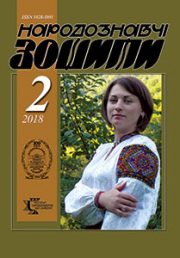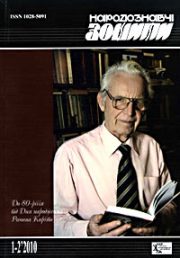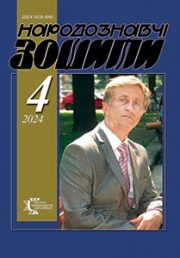The Ethnology Notebooks. 2017, 2 (134), 341—354
UDK 398.431
DOI https://doi.org/10.15407/nz2017.02.341
Halaichuk Volodymyr, Candidate of Sciences in History, Associate Professor
of the Department of Ethnology,
Ivan Franko National University of Lviv,
Universytetska Street 1, 79000, Lviv, Ukraine.
Contacts: e-mail: clio@lnu.edu.ua
Abstract. Traditional beliefs of Pokuttia residents about domestic spirits are illustrated in the article on the basis of ethnographic materials. It is marked that the basic on the inspected territories is a type of a goblin purchased from little chicken egg («znosok»), or by other method, as a spiritenriching that distinctly gravitates to character of devil.
Keywords: Pokuttia, demonology, beliefs, domestic spirits, spiritenriching, domovyk (goblin), caress, grasssnake.
Received 27.03.2017
REFERENCES
Arkhiv L’vivs’koho natsional’noho universytetu imeni Ivana Franka. F. 119. Op. 17. Spr. 336-E (Pol’ovi etnohrafichni materialy do tem «Kalendarna obriadovist’» i «Narodna demonolohiia», zibrani u Horodenkivs’komu rajoni Ivano-Frankivs’koi oblasti 03—14 lypnia 2015 r. Halajchukom Volodymyrom Vasyl’ovychem). 83 ark. [in Ukrainian].
Hnatiuk, V. (1912). Znadoby do ukrains’koi demonol’ogii. (T. II. Vyp. 1). In Etnografichnyj zbirnyk. (Vol. XXXIII, pp. 1—237) [in Ukrainian].
Hnatiuk V. (1912). Znadoby do ukrains’koi demonol’ogii. (Vol. II. Vyp. 2). In Etnografichnyj zbirnyk. (T. XXXIV, pp. 1—280) [in Ukrainian].
Kyrchiv, R. (2015). Istoriohrafiia etnohrafichnoho doslidzhennia Pokuttia. Narodoznavchi zoshyty, 1 (121), 70—90 [in Ukrainian].
Mokhoruk, D.I. (2008). Selo moie Toporivtsi. Istoryko-kraieznavchyj ta etnohrafichnyj zbirnyk. Semptymolohiia. (Vol. 6: Etnohrafichnyj obraz sela). Kosiv: Pysanyj kamin’ [in Ukrainian].
Silets’kyj, R. (2015). Buzyna v narodnykh demonolohichnykh povir’iakh ukraintsiv. Naukovi zoshyty istorychnoho fakul’tetu L’vivs’koho universytetu, 16, 140—150 [in Ukrainian].
I[lkiewi]cz Mirosław. (1839). O mitologii ruskiej według podania ludu. In Sławianin: al’manakh (Vol. 2, pp. 91—95). Lwów [in Polish].
Kolberg, O. (1888). Pokucie. Obraz etnograficzny (Vol. III). Kraków [in Polish].






